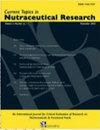Extraction and Compositional Analysis of Anthocyanins and Polysaccharides from Aronia Melanocarpa Fruit
IF 0.4
4区 医学
Q4 NUTRITION & DIETETICS
Current Topics in Nutraceutical Research
Pub Date : 2023-03-30
DOI:10.37290/ctnr2641-452x.21:495-501
引用次数: 0
Abstract
We have examined the basic composition of anthocyanins and polysaccharides, the active components in Aronia melanocarpa fruit. To this end, microwave-assisted ethanol extraction and cellulase enzymatic hydrolysis were employed to extract anthocyanins and crude polysaccharides, respectively. Aronia melanocarpa fruit polysaccharides were separated and purified by DEAE-52 cellulose and Sephadex G-100 glucan gel column chromatography, followed by high-performance liquid chromatography. The results demonstrated that the optimal extraction parameters of anthocyanin from Aronia melanocarpa fruit were a 60% ethanol volume fraction, a liquid-to-solid ratio of 30:1, a microwave time of 60 s, and a microwave power of 210 W. The extracted anthocyanins reached 200.47 mg/100 g, while the yield of polysaccharides was 3.82%. Anthocyanins in Aronia melanocarpa fruit were mainly composed of cyanidin, delphinidin, and mallow pigment, among which cyanidin was the main component, with a content as high as 90.79%. There were two distinct fractions of polysaccharides. The fraction-I polysaccharides were mainly composed of rhamnose, galacturonic acid, glucose, galactose, and arabinose, with a molar ratio of 8.80: 8.97: 2.38: 27.46: 47.94. In contrast, the fraction-II polysaccharides were primarily composed of rhamnose, glucuronic acid, galactose, xylose, and arabinose, with a molar ratio of 1.67: 9.22: 8.47: 70.69: 6.16. The results of this study can provide a reference for the in-depth development of Aronia melanocarpa resources黑桫椤果实中花青素和多糖的提取及成分分析
本文研究了黑桫椤果实中有效成分花青素和多糖的基本组成。为此,采用微波辅助乙醇提取法和纤维素酶水解法分别提取花青素和粗多糖。采用DEAE-52纤维素和Sephadex G-100葡聚糖凝胶柱层析对黑桃果多糖进行分离纯化,然后采用高效液相色谱法。结果表明,提取黑果野莓果实花青素的最佳工艺参数为乙醇体积分数60%、液料比30:1、微波时间60 s、微波功率210 W。花青素提取率为200.47 mg/100 g,多糖得率为3.82%。黑果野樱草果实中的花青素主要由花青素、飞燕素和锦葵色素组成,其中花青素为主要成分,含量高达90.79%。多糖有两个不同的组分。部分i多糖主要由鼠李糖、半乳糖醛酸、葡萄糖、半乳糖和阿拉伯糖组成,摩尔比为8.80:8.97:2.38:27.46:47.94。ⅱ段多糖主要由鼠李糖、葡萄糖醛酸、半乳糖、木糖和阿拉伯糖组成,摩尔比为1.67:9.22:8.47:70.69:6.16。本研究结果可为黑檀资源的深入开发提供参考
本文章由计算机程序翻译,如有差异,请以英文原文为准。
求助全文
约1分钟内获得全文
求助全文
来源期刊
CiteScore
1.10
自引率
0.00%
发文量
36
审稿时长
>12 weeks
期刊介绍:
Current Topics in Nutraceutical Research is an international, interdisciplinary broad-based peer reviewed scientific journal for critical evaluation of research on chemistry, biology and therapeutic applications of nutraceuticals and functional foods. The major goal of this journal is to provide peer reviewed unbiased scientific data to the decision makers in the nutraceutical and food industry to help make informed choices about development of new products.
To this end, the journal will publish two types of review articles. First, a review of preclinical research data coming largely from animal, cell culture and other experimental models. Such data will provide basis for future product development and/or human research initiatives. Second, a critical evaluation of current human experimental data to help market and deliver the product for medically proven use. This journal will also serve as a forum for nutritionists, internists, neurologists, psychiatrists, and all those interested in preventive medicine.
The common denominator of all of the topic to be covered by the journal must include nutraceuticals and/functional food. The following is an example of some specific areas that may be of interest to the journal. i) Role of vitamins, minerals, antioxidants and phytonutrients on cardiovascular health, cancer, diabetes, ocular health, mental health, men’s health, women’s health, infant nutrition, ii) Role of herbals on human health, iii) Dietary supplements and sleep, iv) Components of diet that may have beneficial effect on human health, v) regulation of apoptosis and cell viability, vi) Isolation and characterization of bioactive components from functional foods, vii) Nutritional genomics, and viii) Nutritional proteomics.

 求助内容:
求助内容: 应助结果提醒方式:
应助结果提醒方式:


